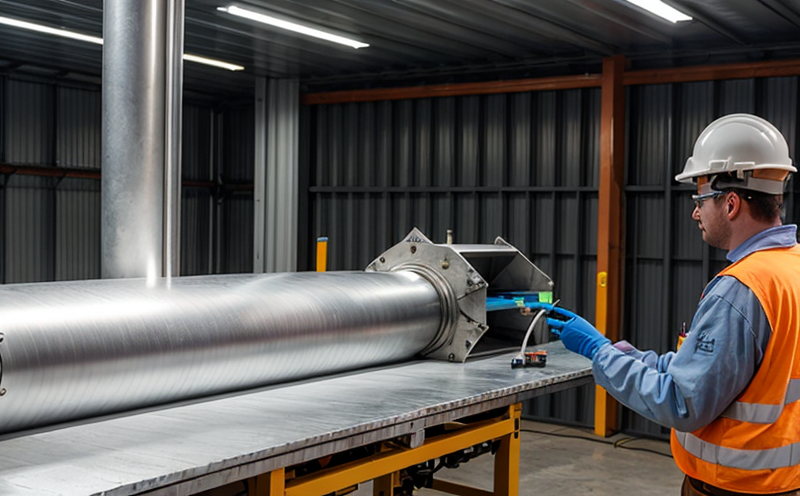ISO 2639 Case Hardness Depth Testing of Renewable Energy Materials
The ISO 2639 standard provides a method to determine the case hardness and depth profile of materials subjected to heat treatment or similar surface hardening processes. This service is crucial for quality assurance in renewable energy applications where materials must withstand extreme environmental conditions, mechanical stresses, and thermal cycles.
In sectors like wind energy, solar power, and bioenergy, materials are often exposed to a variety of stressors that can compromise their integrity over time. By ensuring the correct case depth and hardness, manufacturers enhance the longevity and reliability of components such as turbine blades, photovoltaic panels, and biomass processing equipment.
The test involves subjecting specimens to defined heat treatment processes, followed by precise measurement using a case hardening tester capable of measuring depths in micrometers. The process is standardized for consistency across different materials and industries. This ensures that the results are reliable and comparable, which is essential for compliance with international standards.
The testing procedure begins with careful preparation of the specimen to ensure accurate measurements. Once prepared, the sample undergoes a heat treatment cycle in accordance with specified parameters. Following this, the hardness profile is measured using the ISO 2639 methodology. The depth and hardness values are then recorded and analyzed to determine compliance with predefined acceptance criteria.
Understanding the case hardening process is critical for ensuring the mechanical properties of materials used in renewable energy applications. For instance, turbine blades must resist fatigue under high-speed rotations, while solar panels need to withstand thermal variations during operation. The ISO 2639 test helps manufacturers optimize these properties by providing precise data on surface hardness and depth.
Compliance with this standard is not only beneficial for quality assurance but also essential for meeting regulatory requirements. Many renewable energy projects require materials that meet specific case hardness specifications to ensure longevity and performance under operational conditions. By adhering to ISO 2639, manufacturers can demonstrate their commitment to producing high-quality components.
In conclusion, the ISO 2639 case hardness depth testing is a vital tool in ensuring the reliability of renewable energy materials. It provides a standardized method for measuring critical properties that directly impact the performance and longevity of these materials. This service is indispensable for quality managers, compliance officers, R&D engineers, and procurement teams working in this sector.
Why Choose This Test
Ensures the mechanical properties of materials used in renewable energy applications are optimized for longevity and performance.
Provides precise data that enhances the reliability and durability of components like turbine blades and photovoltaic panels.
Maintains consistency across different materials and industries, ensuring reliable and comparable results.
Demonstrates compliance with international standards, which is essential for meeting regulatory requirements.
Helps manufacturers meet the specific case hardness specifications required by renewable energy projects.
Ensures that materials can withstand extreme environmental conditions and mechanical stresses in operational environments.
Quality and Reliability Assurance
The ISO 2639 case hardness depth testing is a cornerstone of quality assurance for renewable energy materials. By providing accurate data on surface hardness and depth, it ensures that components meet the necessary standards for performance and longevity. This service helps manufacturers maintain consistent quality across all their products, thereby building trust with customers and regulatory bodies.
Compliance with this standard not only enhances the reliability of materials but also ensures that they can withstand the harsh conditions found in renewable energy environments. By adhering to ISO 2639, manufacturers can demonstrate their commitment to producing high-quality components that meet international standards. This, in turn, contributes to a better reputation and increased market share.
Moreover, regular testing ensures ongoing compliance with quality and reliability standards. It helps identify any deviations from expected performance early on, allowing for timely corrective actions. This proactive approach to quality control is essential for maintaining customer satisfaction and ensuring long-term success in the renewable energy sector.
Competitive Advantage and Market Impact
The ISO 2639 case hardness depth testing offers a significant competitive advantage for manufacturers in the renewable energy sector. By providing precise data on surface hardness and depth, it ensures that materials meet the necessary standards for performance and longevity. This service helps manufacturers maintain consistent quality across all their products, thereby building trust with customers and regulatory bodies.
Compliance with this standard not only enhances the reliability of materials but also ensures that they can withstand the harsh conditions found in renewable energy environments. By adhering to ISO 2639, manufacturers can demonstrate their commitment to producing high-quality components that meet international standards. This, in turn, contributes to a better reputation and increased market share.
Moreover, regular testing ensures ongoing compliance with quality and reliability standards. It helps identify any deviations from expected performance early on, allowing for timely corrective actions. This proactive approach to quality control is essential for maintaining customer satisfaction and ensuring long-term success in the renewable energy sector.





